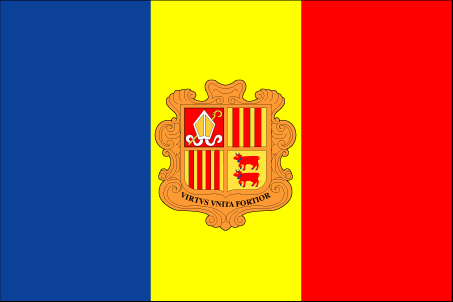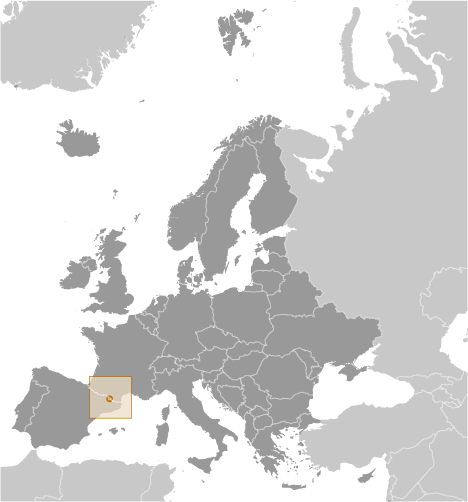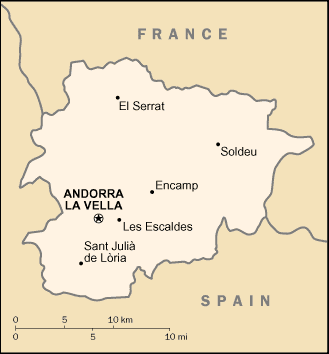For 715 years, from 1278 to 1993, Andorrans lived under a unique co-principality, ruled by French and Spanish leaders (from 1607 onward, the French chief of state and the Spanish bishop of Seu d'Urgell). In 1993, this feudal system was modified with the titular heads of state retained, but the government transformed into a parliamentary democracy. For decades Andorra enjoyed its status as a small refuge of fiscal and banking freedom and benefitted from Spanish and French tourists attracted to the country's duty-free shopping. The situation has changed in recent years as Andorra started to tax foreign investment and other sectors. Tourism accounts for over 80% of Andorra's gross domestic product.
Population
84,525 (July 2010 est.)
Country comparison to the world:198
Nationality
Noun:Andorran(s)
Adjective: Andorran
Ethnic groups
Spanish 43%, Andorran 33%, Portuguese 11%, French 7%, other 6% (1998)
Religions
Roman Catholic (predominant)
Languages
Catalan (official), French, Castilian, Portuguese
Country Name
Conventional long form: Principality of Andorra
Conventional short form:Andorra
Local long form:Principat d'Andorra
Local short form:Andorra
Government Type
parliamentary democracy (since March 1993) that retains as its chiefs of state a coprincipality; the two princes are the president of France and bishop of Seu d'Urgell, Spain, who are represented in Andorra by the coprinces' representatives
Capital
Name:Andorra la Vella
Geographic coordinates:42 30 N, 1 31 E
Time difference:UTC+1 (6 hours ahead of Washington, DC during Standard Time)
daylight saving time: +1hr, begins last Sunday in March; ends last Sunday in October
Administrative divisions
7 parishes (parroquies, singular - parroquia); Andorra la Vella, Canillo, Encamp, Escaldes-Engordany, La Massana, Ordino, Sant Julia de Loria
Independence
1278 (formed under the joint suzerainty of the French Count of Foix and the Spanish Bishop of Seu d'Urgel)
National Holiday
Our Lady of Meritxell Day, 8 September (1278)
Constitution
Andorra's first written constitution was drafted in 1991; approved by referendum 14 March 1993; effective 28 April 1993
Legal system
based on French and Spanish civil codes; no judicial review of legislative acts; has not accepted compulsory ICJ jurisdiction
Suffrage
18 years of age; universal
Executive branch
Chief of state:French Coprince Nicolas SARKOZY (since 16 May 2007); represented by Christian FREMONT (since September 2008) and Spanish Coprince Bishop Joan-Enric VIVES i Sicilia (since 12 May 2003); represented by Nemesi MARQUES i Oste (since 30 July 2003)
Head of government:Executive Council President Jaume BARTUMEU CASSANY (since 5 June 2009)
Cabinet:Executive Council or Govern designated by the Executive Council president
(For more information visit the World Leaders website)
Elections: Executive Council president elected by the General Council and formally appointed by the coprinces for a four-year term; election last held on 26 April 2009 (next to be held in April-May 2013)
Election results: Jaume BARTUMEU CASSANY elected executive council president; percent of General Council vote - NA
Legislative branch
unicameral General Council of the Valleys or Consell General de las Valls (28 seats; members are elected by direct popular vote, 14 from a single national constituency and 14 to represent each of the seven parishes; to serve four-year terms)
Elections: last held on 26 April 2009 (next to be held in March-April 2013)
Election results: percent of vote by party - PS 45%, Reformist Coaliton 32%, Andorra for Change 19%, Andorran Green 4%; seats by party - PS 14, Reformist Coalition 11, Andorra for Change 3
Judicial branch
Tribunal of Judges or Tribunal de Batlles; Tribunal of the Courts or Tribunal de Corts; Supreme Court of Justice of Andorra or Tribunal Superior de Justicia d'Andorra; Supreme Council of Justice or Consell Superior de la Justicia; Constitutional Tribunal or Tribunal Constitucional
Political Parties and Leaders
Andorra for Change [Juan Eusebio NOMEN CALVET]; Greens of Andorra [Isabel LOZANO MUNOZ]; Liberal Party of Andorra or PLA [Joan GABRIEL i ESTANY] (formerly Liberal Union or UL); New Center [Vicenc MATEU] (formerly Andorran Democratic Center Party); Reformist Coalition [Joan GABRIEL i ESTANY] (includes the Liberal Party and New Center); Social Democratic Party or PS [Jaume BARTUMEU CASSANY] (formerly part of National Democratic Group or AND)
Political pressure groups and leaders
NA
International organization participation
CE, FAO, ICAO, ICCt, ICRM, IFRCS, Interpol, IOC, IPU, ITU, OIF, OPCW, OSCE, UN, UNCTAD, UNESCO, Union Latina, UNWTO, WCO, WHO, WIPO, WTO (observer)
Diplomatic representation in the US
Chief of mission: Ambassador Narcis CASAL Fonsdeviela
Chancery: 2 United Nations Plaza, 25th Floor, New York, NY 10017
Telephone:[1] (212) 750-8064
FAX:[1] (212) 750-6630
Diplomatic representation from the US
the US does not have an embassy in Andorra; the US Ambassador to Spain is accredited to Andorra; US interests in Andorra are represented by the US Consulate General's office in Barcelona (Spain); mailing address: Paseo Reina Elisenda de Montcada, 23, 08034 Barcelona, Spain; telephone: [34] (93) 280-2227; FAX: [34] (93) 280-6175
Flag description
three vertical bands of blue (hoist side), yellow, and red, with the national coat of arms centered in the yellow band; the latter band is slightly wider than the other two so that the ratio of band widths is 8:9:8; the coat of arms features a quartered shield with the emblems of (starting in the upper left and proceeding clockwise): Urgell, Foix, Bearn, and Catalonia; the motto reads VIRTUS UNITA FORTIOR (Strength United is Stronger); the flag combines the blue and red French colors with the red and yellow of Spain to show Franco-Spanish protection
note: similar to the flags of Chad and Romania, which do not have a national coat of arms in the center, and the flag of Moldova, which does bear a national emblem













